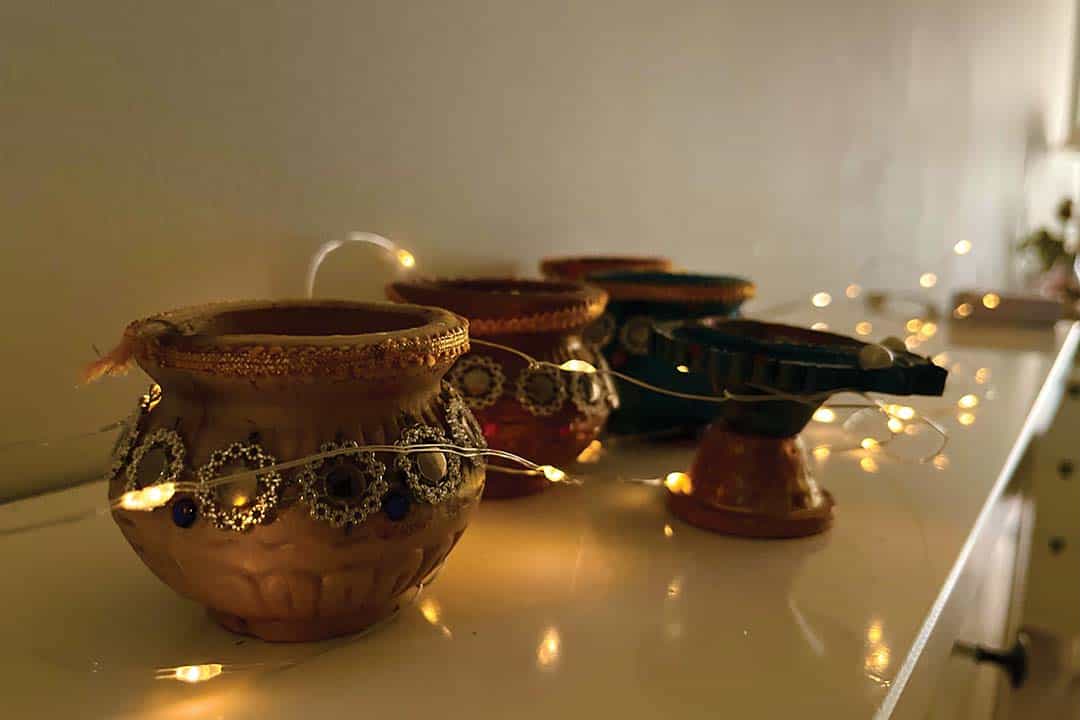This year, Diwali events held by the federated colleges, student associations, and the university provided students with opportunities to commemorate the holiday.
Diwali — the five-day “festival of lights” observed by Hindus, Sikhs, Jains, and some Buddhists as well as across multiple South Asian and Southeast Asian countries — is an important event for many in the U of T community.
Cultural connections
India is the largest country that considers Diwali a statutory holiday. In 2021, 2.3 per cent of U of T’s undergraduate student body was made up of international students from India. Additionally, Canada has one of the largest populations of Indian origin outside of South Asia; according to the 2021 census, roughly 1.3 million Canadians in private households are of Indian ethnicity. As such, many domestic students also celebrate the festival.
Balaprasanth Govindarajulu, a fourth-year economics major and president of the UTSG’s Hindu Students Council (HSC), told The Varsity, “The thing that’s important to me about Diwali is that it’s the victory of righteousness.” Despite the holiday being celebrated across different religions, and each with its own origin story, Diwali ultimately represents the victory of good over evil.
Other students view Diwali as an opportunity to connect to their culture and spend time with others. “Diwali is something I’ve grown up celebrating each year,” said Shiva Ivaturi, head of Trinity College’s Non-Resident Affairs Committee, which represents commuter students at the college. “It’s a very inclusive and universally recognized celebration that we can all indulge in.”
Celebrations at U of T
Events to celebrate Diwali were held across the university, hosted by St Michael’s College, University College, and the HSC, among others.
The UTSC International Student Centre held a Diwali Celebration in the UTSC meeting place; students decorated diyas, created rangolis, and gathered to eat pakora and samosa.
On the evening of October 24, Trinity College also hosted a Diwali event. Decks of cards and flowers adorned the tables, and people spoke to each other over an array of Indian food. The event, which was organized by Ivaturi and Trinity College Head of Arts Devyani Chandra, drew around 30 people in a mixture of formal and casual clothing.
Many attendees had celebrated Diwali before and came to commemorate the day with friends. “We celebrate Diwali every year with my family back in India,” said Niska Srivastava, a student attendee. “This year, I wanted to do something with other Indian people.”
Other students received their first taste of Diwali at U of T’s celebrations. “I’ve never celebrated Diwali before,” said Daniel Stedman, another attendee. “But I have a lot of friends who do, so I decided to come by.”
Ivaturi emphasized that everyone can appreciate the meaning of Diwali. “Diwali really celebrates happiness and prosperity. I think those are values and elements that every student and every person can really aspire toward wanting or achieving or having achieved at some point in their lives,” said Ivaturi. “The nature of Diwali is so inclusive, and that’s why I wanted to bring it [to the university] as a student event.”
Room for growth
In 2020, U of T collaborated with the HSC to establish a Hindu shrine at the Multi-faith Centre. According to Govindarajulu, the shrine has been a boon to the community, allowing them to hold celebrations and giving students a place to pray.
However, Govindarajulu believes that the university could do more to support students by hosting Diwali celebrations on all campuses and helping students plan events. For instance, he proposed that the university help students find permits for firecrackers, which are a traditional part of Diwali celebrations in India. “We let go of a lot of festivities and important celebrations when we come here,” he said.
According to a U of T spokesperson, “the University does not typically organize events in celebration of religious observances; however, support is provided to student organizations, staff or faculty who wish to organize events.” Such support includes hosting student-run events at the Multi-Faith Centre, where the HSC’s Diwali event took place. To ensure safety, fireworks are not permitted on the UTSG campus, and groups at UTM and UTSC must reach out to campus offices and obtain municipal permits before setting off fireworks on campus.
Ivaturi hopes that, in the future, clubs and student governance groups can collaborate to celebrate events from a variety of cultures. “I think the onus is on student governance groups as well as cultural associations to build more of a connection,” said Ivaturi. “It’s really important for cultural associations to reach out to student governance groups and vice versa to learn more about how we can create this [type of] event and make it a positive experience.”


